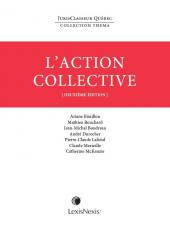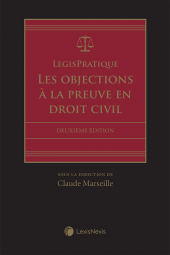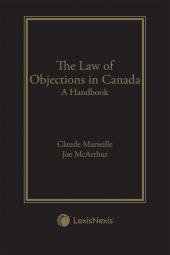The Law of Objections in Canada: A Handbook
One Year Subscription Only Terms
Subscribers receive the product(s) listed on the Order Form and any Updates made available during the annual subscription period. Shipping and handling fees are not included in the annual price.
Subscribers are advised of the number of Updates that were made to the particular publication the prior year. The number of Updates may vary due to developments in the law and other publishing issues, but subscribers may use this as a rough estimate of future shipments. Subscribers may call Customer Support at 800-833-9844 for additional information.
Subscribers may cancel this subscription by: calling Customer Support at 800-833-9844; emailing customer.support@lexisnexis.com; or returning the invoice marked 'CANCEL'.
If subscribers cancel within 30 days after the product is ordered or received and return the product at their expense, then they will receive a full credit of the price for the annual subscription.
If subscribers cancel between 31 and 60 days after the invoice date and return the product at their expense, then they will receive a 5/6th credit of the price for the annual subscription. No credit will be given for cancellations more than 60 days after the invoice date. To receive any credit, subscriber must return all product(s) shipped during the year at their expense within the applicable cancellation period listed above.
Product description
Comprehensive and useful
Based on Claude Marseille’s well-known French publication, LegisPratique – Les objections à la preuve en droit civil, and with chapters written by a collection of expert contributing authors, The Law of Objections in Canada: A Handbook fills a gap in the marketplace by focusing exclusively on the 50 possible objections that lawyers can make in a trial under the common law.
This one-stop guide for the rules of law relating to objections is an excellent reference book: comprehensive, easy to understand and simple to navigate. Each chapter is organized into four sections: statement of law, rationale, scope and exceptions. The resulting logical flow and detailed explanations make this manual indispensable.
In addition, the at-a-glance Table of Objections is particularly useful.
An essential publication
An easy-to-use, accessible resource, The Law of Objections in Canada: A Handbook will quickly become invaluable to:
- Civil litigation and criminal lawyers who will benefit from a resource that enables them to find specific objections quickly and easily – whether in the courtroom or in the office
- Judges as they are frequently called upon to make rulings on evidence, often without advanced warning. With this volume at their fingertips, judges will be able to reliably comment and rule on issues of evidence
- Law schools and law libraries who want to provide comprehensive research materials for law students, faculty and other users
Table of contents
Part I: Objections Respecting the Object of Proof
A. Relevance and related rules
• Relevance
• Character Evidence
• Similar Fact Evidence
B. Rules promoting fairness at trial
• Not pleaded matters
• No pre-trial disclosure
• Splitting the case
C. Privilege
• Solicitor-client privilege
• Litigation privilege
• Settlement privilege
• Crown immunity
• Parliamentary privilege
• Judicial immunity
• Spousal privilege
• Informer or whistleblower privilege
• Disclosure prohibited by statute
• Case-by-case privilege
D. Rules protecting fundamental rights and freedoms
• Evidence obtained in violation of fundamental rights and freedoms
• Privilege against self-incrimination
• Language used in Court
Part II: Objections Respecting the Means of Proof
A. Testimony
1. Admissibility
• Statute of Frauds
• Best evidence rule
• Parol evidence rule
• Opinion
2. Opinion
• Opinion of factual witness
• Admissibility of expert testimony
3. Hearsay
• Hearsay
4. Transcripts
• Production by party not adverse in interest
• Implied undertaking of confidentiality
5. Examination at Trial
• Capacity
• Oath
• Examination in chief
• Cross-examination
• Re-examination
• Misc. objections at all stages of examination
B. Documentary evidence
1. Admissibility
• Hearsay
2. Presentation
• Best evidence rule
• Prior notice
C. Admissions
• Not binding
D. Real evidence
• Best evidence rule
• Prior notice
E. Circumstantial evidence
• Character Evidence
• Similar Fact Evidence
Related products
-
 E-Commerce Legislation and Materials in Canada / Lois sur le commerce électronique au Canada et documents connexes, édition 2008 EditionRelease date: December 31, 2007$155.00
E-Commerce Legislation and Materials in Canada / Lois sur le commerce électronique au Canada et documents connexes, édition 2008 EditionRelease date: December 31, 2007$155.00 -
 Thema – Action collective, 2e éditionRelease date: January 30, 2019$85.00
Thema – Action collective, 2e éditionRelease date: January 30, 2019$85.00 -
 LegisPratique – Les objections à la preuve en droit civil, 2e éditionRelease date: October 31, 2022$150.00
LegisPratique – Les objections à la preuve en droit civil, 2e éditionRelease date: October 31, 2022$150.00
 Lexis Nexis
Lexis Nexis 